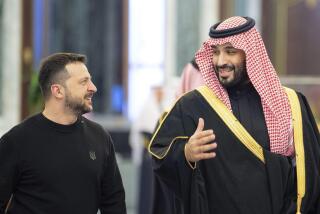Israel, Jordan leaders hold high-level, low-profile meeting
JERUSALEM -- Israeli Prime Minister Benjamin Netanyahu met Thursday with Jordanian King Abdullah II to discuss developments related to the Israeli-Palestinian peace negotiations, according to Petra, Jordan’s news agency.
Netanyahu’s visit to Amman was not announced ahead of time, and was publicly reported from Jordan only after it ended.
King Abdullah’s talks with Netanyahu follow separate meetings held recently with Secretary of State John F. Kerry and with Palestinian Authority President Mahmoud Abbas.
Thursday’s meeting addressed Jordan’s wish to see the peace talks make tangible progress that meets the aspirations of the Palestinian people while protecting Jordan’s interests, according to Petra.
In a statement, Netanyahu’s office said: “The PM stressed the important role played by Jordan, under King Abdullah’s leadership, in the efforts to bring about an agreement. The PM emphasized that Israel places a premium on security arrangements, including Jordan’s interests, in any future agreement that will take into consideration the peace treaty between Jordan and Israel, signed 20 years ago. The PM and His Majesty discussed an array of economic cooperation between both countries in a number of fields as well as other regional matters.”
Jordan is not a direct participant in the talks but many concerns make it a very interested party, keen on being kept in the loop.
Recent reports suggest increasing Jordanian concern that any emerging road map for implementing a peace agreement between Israel and the Palestinian Authority not compromise Jordan’s strategic interests.
These include the security arrangements reportedly proposed by the U.S. regarding the Jordan Valley area of the West Bank that shares a long border with the Hashemite Kingdom, as well as any settlement in Jerusalem, where Jordan’s role as custodian of the Muslim holy sites is recognized by the Palestinian Authority and Israel.
Jordan appears especially concerned about any agreement regarding Palestinian refugees, and seeks to secure any rights and compensation for the approximately 2 million Palestinian refugees and their descendants living in the country.
Sobelman is a special correspondent.
More to Read
Sign up for Essential California
The most important California stories and recommendations in your inbox every morning.
You may occasionally receive promotional content from the Los Angeles Times.










